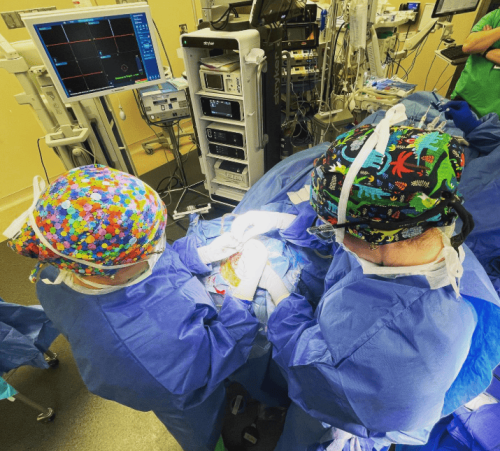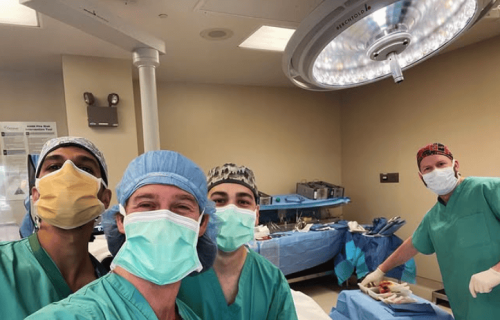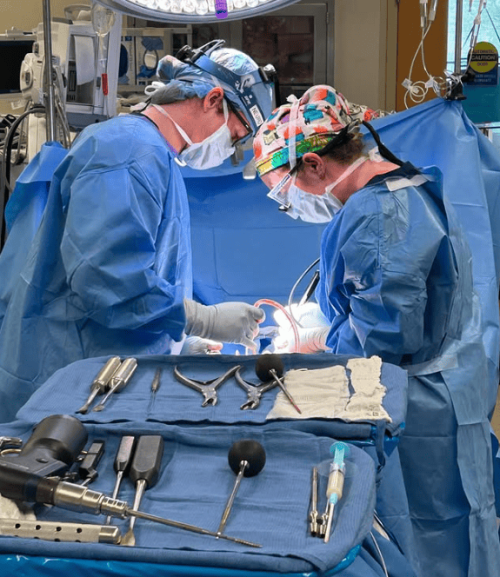
The Tulane/Ochsner Neurosurgery Residency Program offers a diverse training background. The program exposes residents to a variety of outstanding medical institutions in the New Orleans metropolitan area. Each site supplies trainees with a unique experience with respect to medical systems, subspecialties, and patient populations.
Rotation Sites
East Jefferson General Hospital, http://www.ejgh.org. A rotation at EJGH allows our trainees to be the only resident on a busy private practice neurosurgery service providing them with one-on-one training and understanding of a non-academic health care system.
Ochsner Medical Center, http://www.ochsner.org. The other half of the neurosurgery experience is at this hospital system allowing residents to continue to hone skill sets and achieve scientific goals.
EJGH Healthy Lifestyles - Neurosurgery
Host Liz Delsa interviews Dr. Aaron Dumont to learn a bit more about Neurosurgery.
Houston Methodist Hospital, www.houstonmethodist.org. As a PGY-4, the resident will spend an intensive two months learning neuropathology under the tutelage of Dr. Suzanne Powell.
Call System
Residents have a manageable call system whereby one resident is assigned to either Tulane Medical Center or Ochsner Medical Center. PGY-1’s takes calls with a senior resident who is always available as a backup. As residents advance through the program, progressively less calls are taken.
Elective
The PGY-4 year is reserved for research. Residents are welcome to structure this year according to their specific interests in neurosurgery. Both basic science and clinical opportunities are available. Residents are encouraged to utilize the many resources Tulane University and Ochsner Clinic Foundation have available to advance their educational pursuits.
The PGY-7 year, starting in 2021-2022 will also be an elective year. Residents will have completed their chief residency as a PGY-6 and can use their PGY-7 time as a transition-to-practice time, during which, education on the business of medicine as well as refining of clinical abilities can be pursued. Residents may also utilize the PGY-7 year to complete CAST-accredited fellowships in complex spine or neuro-oncology at Tulane/Ochsner. Applications for CAST-accreditation in cerebrovascular surgery and neocritical care at Tulane/Ochsner are pending approval. Residents may also pursue training at other approved sites at the discretion of the program director.

Conference Schedules
Spine Conference
On the 1st, 2nd, and 3rd Friday morning of each month from 7:15 am-8:15 am residents and fellows present interesting cases to highlight both the basics and nuances of spine surgery. The conference also serves as a pre-operative forum attended by neurosurgeons as well as orthopedic surgeons during which plans for complex cases may be discussed
Tumor Conference
The 4th Friday of each month from 7:15 am-8:15 am is dedicated to education on tumors of the brain and spine. With faculty guidance, residents and fellows present difficult and interesting cases. Attendance by radiology and pathology faculty enhances the discussion and improves patient care.
Neuroradiology Conference
Every Wednesday from 8:00 am to 9:00 am, neurosurgeons and neuroradiologists gather to review interesting images and discuss neuro-interventional procedures.
Neuropathology
The Tulane/Ochsner resident join the University of Virginia neuropathology conference.
Grand Rounds
Grand Rounds are held on the 1st, 2nd, and 4th Friday every month from 2pm-5pm. During the fall and winter, dedicated board review sessions for the American Board of Neurological Surgery Primary Written Exam are administered with faculty guidance from 2-3pm. The remainder of the time is spent with resident, faculty, or guest lecturer-led discussions on all facets of neurosurgery including cerebrovascular, spine, tumor, functional, pediatrics, trauma, and peripheral nerve. Topics such as professional development, wellness, and the healthcare economics are covered as well.
Morbidity and Mortality (M &M)
Morbidity and Mortality conference take place on the 3rd Friday of each month from 3pm-5pm. All complications are presented via a brief case summary, identification of the complication, a literature review, and strategies to potentially prevent or minimize the risk of recurrence.
Lectures
Dean Echols Lecture
In the fall, a distinguished member of the neurosurgery community is invited to lecture at Tulane to the faculty and residents. The residents have the opportunity to have dinner with the speaker on the evening prior to the lecture during this greatly enriching opportunity. Dr. Echols came to New Orleans in 1937 where he helped establish the Tulane/Ochsner training program. He was one of the eight founders of the American Academy of Neurological Surgery (AANS) and its first president.

Edward Connolly Lecture
An outstanding neurosurgeon, chosen by the residents and faculty, is invited in the spring to speak with the Tulane/Ochsner department. Again, residents have the unique chance to spend an evening with a premier neurosurgeon. Dr. Connolly was a longstanding chairman of Ochsner neurosurgery as well as a founding member of the Combined Section of the American Association of Neurological Surgeons (AANS), Congress of Neurological Surgeons (CNS) section on Disorders of the Spine Peripheral Nerves and served both as treasurer and chairman. He was a member of the American Board of Neurological Surgeons and served as the president of the AANS.
Testing/Exams
Check often for important information.
Industry-Sponsored Labs
Information will be posted when available
National Conferences
Information will be posted when available
Journal Club
Journal Club is held bimonthly. Three or four scholarly articles are chosen spanning the full range of neurosurgical topics. Faculty are present to foster and guide discussion.
